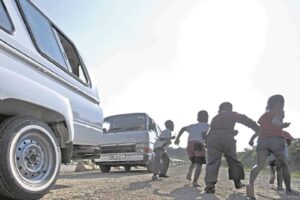The organisations will apply for a court order prohibiting the media from revealing the identity of children involved in a crime, in any way, even after they turn 18.
Child rights organisations and the media will square off in the North Gauteng High Court in Pretoria next week in a legal battle over the protection of the anonymity afforded to child victims and offenders.
The Centre for Child Law (CCL), Childline SA, the National Institute for Crime Prevention and Reintegration of Offenders and Media Monitoring Africa will be taking on the country’s major media groups.
The children’s rights advocates will apply for a court order prohibiting the media from revealing the identity of children involved in a crime as victim, witness or offender – even after they turn 18.
The child rights groups are seeking an order to ensure section 154(3) of the Criminal Procedure Act applies to child victims of crime as well, and that child victims, witnesses, accused and offenders do not forfeit the protection of the section when they reach 18.
Alternatively, the organisations want the court to declare the section of the Act unconstitutional if it does not provide such protection to children. CCL became involved in the case when it assisted the teenager who became known as Zephany Nurse to obtain an interdict to stop the media from identifying her once she turned 18.
ALSO READ: Madonsela defied order to return state BMW, says Mkhwebane’s office
The interdict was granted pending the outcome of the application around the interpretation of section 154 of the Act.
CCL director Ann Skelton, in court papers, accused the media of deliberately violating the court order and causing severe emotional harm to the girl, who was abducted as a baby.
She said the media stood poised to identify the girl against her wishes and if the order sought was not granted, Zephany would have no protection whatsoever.
The organisations contend that important aspects of the rehabilitation and reintegration into society of child victims, accused persons and witnesses could be disrupted if their identities are revealed after they turn 18.
The media groups contend that the section does not provide children protection of anonymity after they turn 18 and that the relief sought by the child rights groups casts the net too wide.
For more news your way, follow The Citizen on Facebook and Twitter.
Support Local Journalism
Add The Citizen as a Preferred Source on Google and follow us on Google News to see more of our trusted reporting in Google News and Top Stories.








